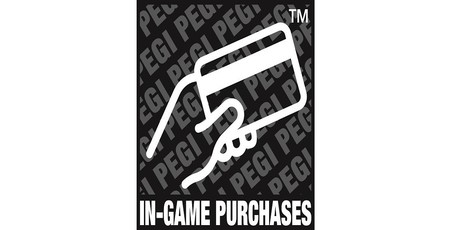PEGI adds in-game purchase warning symbol
August 31, 2018 | 11:00

The Pan-European Game Information (PEGI) organisation has announced that it is adding a new warning symbol to its collection, to alert buyers that a game contains in-game purchases - the logo being, naturally, a hand with credit card outstretched.
Launched in 2003 by the Interactive Software Federation of Europe, the Pan-European Game Information programme is responsible for placing games released in Europe into suitable age categories from three up to 18. At the same time the organisation adds 'content descriptors', visual logos explaining that a title has violence, bad language, fear/horror, sex, drugs, discrimination, and gambling - though, controversially, the latter does not apply to 'loot box' content, where players can pay real-world money for a chance to receive a particular in-game item.
In the first change to the descriptors since 2015's dropping of the online interaction symbol, PEGI has announced it's adding a new one: in-game purchases, for titles that allow players to buy in-game items using real-world money - whether that's microtransactions or larger downloadable content packs.
'Making parents aware of the existence of optional in-game purchases upfront is an important first step. PEGI will now make this information available at the point of purchase, so that a parent can decide whether and how they want to monitor and/or limit a child’s spending,' explains PEGI managing director Simon Little. 'While we know that parents use different methods to control spending, parental control tools are a very helpful next step in making sure that the overall online experience of the child is safe, including the possibility to control spending. Entering into a dialogue with the child about the games they enjoy is certainly a must for all parents. It will provide them with the necessary context to create a gaming environment both the children and the parents are comfortable with.'
PEGI points to an Ipsos survey which claims that two in five parents are aware their child pays real-world money for in-game items, with eight in 10 having an agreement in place about their spending - ranging from asking permission before each purchase, setting a spending limit, the use of parental control functionality, allowing only the use of pre-paid cards to force a spending limit, or actively monitoring credit card bills for activity. Conversely, only two percent of respondents did not monitor their child's spending, the survey found.
The addition of the new descriptor, it is hoped, will make it more clear to parents when they need to be discussing in-game purchasing with their children - but given earlier studies show that PEGI ratings are routinely ignored, even in the UK where they hold the same legal weight as the British Board of Film Classification (BBFC) ratings for films, suggest that it may be a case of spitting in the wind.

MSI MPG Velox 100R Chassis Review
October 14 2021 | 15:04









Want to comment? Please log in.